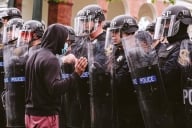You have /5 articles left.
Sign up for a free account or log in.
The University of Virginia is eager to tout the legacy of Thomas Jefferson, its most well-known founder. The first line of UVA’s "about" page states that the third U.S. president founded the university in 1819 and describes his vision as “a bold experiment -- a public university designed to advance human knowledge, educate leaders and cultivate an informed citizenry.”
It’s also true that Jefferson, who owned 607 slaves during his lifetime, envisioned UVA to be “an institution with slavery at its core.” But that’s not on the "about" page.
That information is included in a 96-page report released in late July by the President’s Commission on Slavery and the University. The commission was convened in 2013 by the then president, Teresa Sullivan (who recently retired), to examine the university’s racist past. The report details the university’s history with slavery and, uncharacteristically, acknowledges Jefferson’s participation in slavery.
"Jefferson’s architectural plan for the university created distinct zones for the students and for the enslaved. The enslaved were to live and work in the basements and in the garden work yards where students were in theory to have little reason to venture,” the report reads. “Students were to spend their time in their dormitory rooms, in pavilion classrooms, and in the library -- places where the enslaved were to have little reason to venture.”
After Jefferson’s death in 1826, the university “in many ways fulfilled his vision in creating a southern pro-slavery Ivy League school,” the report says. Educational experiences in the late 19th and the first half of the 20th century included eugenics and white supremacist thought.
Even though Jefferson wrote that slavery was “evil,” he also believed that “African Americans were incapable of the full fruits of freedom,” and that “to end slavery would be to invite race war,” according to the report.
Today, Jefferson is revered by many at UVA as almost untouchable.
“I was thinking about the way that Jefferson was presented when I was in college here, and I would say that there was really only one legacy, and that was Jefferson as a hero,” Christa Dierksheide, a historian at Jefferson's home, Monticello, and a UVA alumna, said during a panel on Jefferson’s legacy in February 2017.
Sullivan received criticism from some students and faculty members for invoking Jefferson without acknowledging his racism during her tenure. In November 2016, she sent two emails to the campus calling for respect and civility during the 2016 election. In the emails, she suggested that students and staff look to Jefferson's actions after the election of 1800 to inspire unity, cooperation and respect.
In response to the emails, Noelle Hurd, a psychology professor at UVA, wrote to Sullivan expressing her disappointment at the "use of Thomas Jefferson as a moral compass." Hundreds more students and employees signed the letter.
Sullivan defended her use of Jefferson's words.
“Quoting Jefferson (or any historical figure) does not imply an endorsement of all the social structures and beliefs of his time, such as slavery," she wrote in an email response to the letter.
“We’ll talk about slavery, we just won’t talk about Thomas Jefferson as a slave owner,” Hurd said to Inside Higher Ed. “That’s where the disconnect comes. It’s like ‘OK, if we’re going to talk about our [racist] history, Thomas Jefferson is really a part of that … I think that is really the linchpin here in terms of [being] unable to move forward, because if Jefferson is the brand, critiquing him is like critiquing the institution.”
Tensions have risen even higher since the 2016 election, especially after the Unite the Right rally that descended on UVA's campus and the surrounding city of Charlottesville last August. A month afterward, students gathered to protest the university’s ineffectual response to the white nationalists and shrouded the Jefferson statue on campus in black. On the university’s founders' day last April, the words “racist + rapist” were spray painted at the base of the statue.
The report is the first time in Hurd’s memory (she’s been teaching at the university for six years) that the university has so openly acknowledged Jefferson’s racist past. Marcus Martin, vice president and chief officer for diversity and equity, said in a press release that Sullivan was "very supportive" while the commission worked.
In addition to the report, the President's Commission on Slavery and the University is also building a memorial to enslaved laborers on campus near the rotunda, creating a course on "slavery and its legacies" and planning other community events to discuss the university's past.








